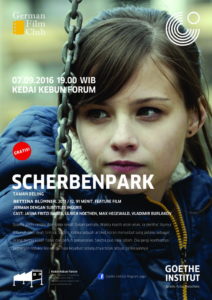

German Film Club
Wednesday, 7 September 2016, 7.00 pm
Auditorium, Kedai Kebun Forum
Jl. Tirtodipuran 3, Yogyakarta
Open for public and free entry
present
Broken Glass Park (Scherbenpark)
Director: Bettina Blümner, 2011/12, feature film, 91 min.
Cast: Jasna Fritzi Bauer, Ulrich Noethen, Max Hegewald, Vladimir Burlakov
Sascha is a clever girl and she certainly has the gift of the gab. As a child, she witnessed her stepfather Vadim killing her mother. When Sascha reads a newspaper article claiming Vadim is a sensitive man who is full of remorse, this is the last straw. She confronts the editor-in-chief. But then events take an unexpected turn.
In “Broken Glass Park” – the central, glass-strewn area of an incredibly depressing, ugly high-rise estate somewhere on the edge of a large German city – the winds blow harsher than elsewhere, and when it rains the damp goes deeper to the bone. Sensitivity is viewed as a weakness and having a big mouth is essential to getting by. Sascha has a big mouth, and is also fearless and incredibly shrewd, yet she is struggling to come to terms with a hugely traumatic experience – the murder of her mother.
Sascha knows only too well who is responsible. All she could do was watch as her stepfather Vadim E. aimed a pistol at her mother and emptied its magazine into her body.
Vadim E. is in prison, but this is no consolation for Sascha. When she’s alone, she curses the day he was born and hopes he dies a slow and painful death. One day, she reads an article in the local paper which depicts her stepfather as a reformed and remorseful sinner and she decides that enough is enough.
The paper’s chief editor Volker Trebur (Ulrich Noethen) gets to feel the full force of Sascha’s rage. There is no doubt, however, that he sincerely regrets what has happened.
He tells Sascha that she can ring him anytime she feels like she can’t go on – presumably thinking he won’t have to come good on this promise. Nearly every day, however, Sascha struggles with the feeling of not being able to go on.
She takes Volker at his word and comes hurtling into a milieu that contrasts starkly with her own.
The newspaper editor’s educated, middle-class universe functions according to an entirely different set of rules than those found in “Broken Glass Park”, and Sascha could quite easily escape her world and make herself at home in this comfortable refuge. But escaping isn’t Sascha’s style at all.
At some point, Sascha decides that she can’t keep walking a tightrope between two worlds. She must find her direction in life all by herself, even if it means taking a detour or two. After all, as the saying goes: you get to see more of life if you take a detour here and there.
Reviews and recommendations:
“(…) What makes this film so special is its many different layers, oscillating between radical violence and callousness, clever humour and simple, yet fitting pearls of wisdom on life. Jasna Fritzi Bauer delivers such a magnificent, powerful and nuanced performance as Sascha that she immediately has the audience under her spell. The young actress gives a dazzling and enthralling portrayal: every expression is perfectly judged, every intonation in her voice just right. The overall production is equally impressive and varied, never failing to surprise and captivate its audience. German film has rarely been so powerful and so diverse.”
(Excerpt from the jury’s statement after certifying the film “especially valuable”)
“A disarmingly direct, straight-talking film with incisive dialogue.”
(Abendzeitung, Munich)
“Jasna Fritzi Bauer gives an impressive performance in BROKEN GLASS PARK as an angry 17-year-old who lives her life between the bleak world of high-rise estates and the idyll of suburbia.”
(Missy Magazine)
Director’s biography:
In 2007, Bettina Blümner’s first feature-length film struck gold: the insightful and authentic documentary POOL OF PRINCESSES won the “Dialogue en Perspective” Award at the Berlin International Film Festival and the German Film Award. The filmic portrait of three 15-year-old girls from Berlin-Kreuzberg – Klara, Mina and Tanutscha – has since attained cult status. Blümner had previously focused on the short film genre. Her studies at the Bauhaus University in Weimar, at the Filmakademie Baden-Württemberg in Ludwigsburg and at the Escuela Internacional de Cine y Televisión on Cuba resulted in the following works: FOREVER YOUNG (1999), SOMMERSONNE (2001), WASH AND GO (2003) and DIE KETTE (2004). In 2009, Bettina Blümner was one of the directors involved in the major TV documentary 24 HOURS BERLIN and directed a segment of the five-hour TV documentary 20 x BRANDENBURG in 2009, which was nominated for a Grimme Award.
For more info please contact:
Uniph 085725809139